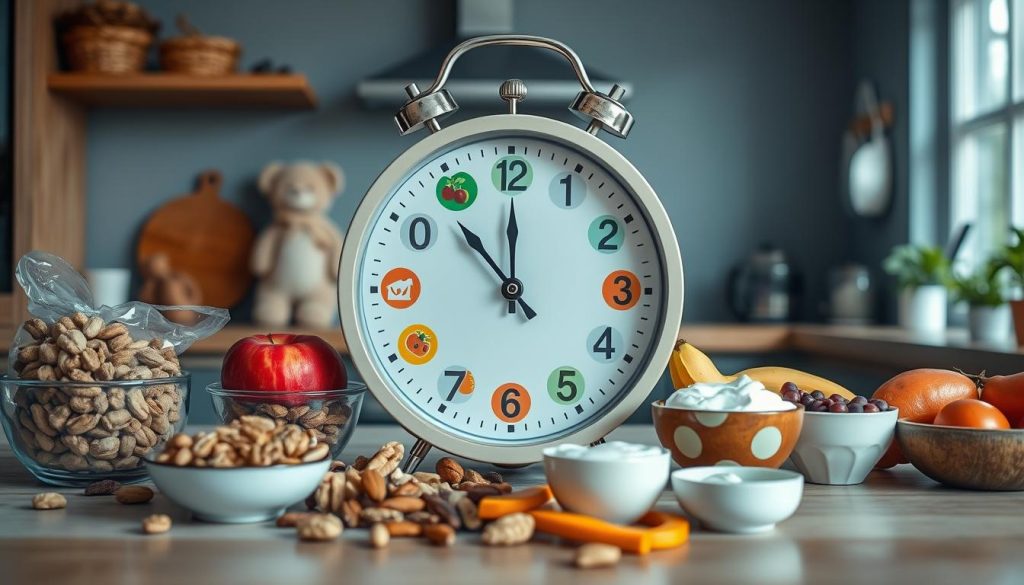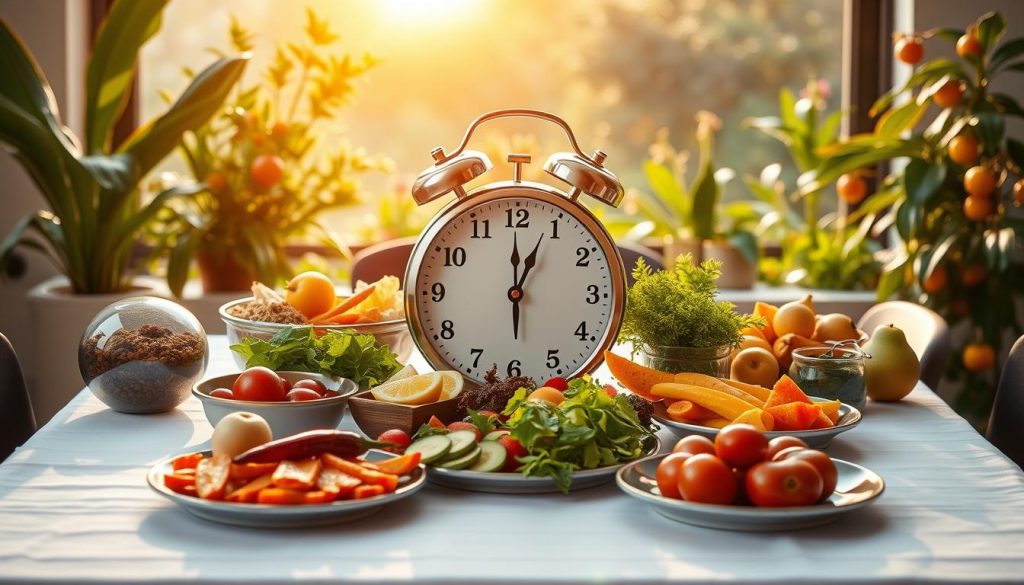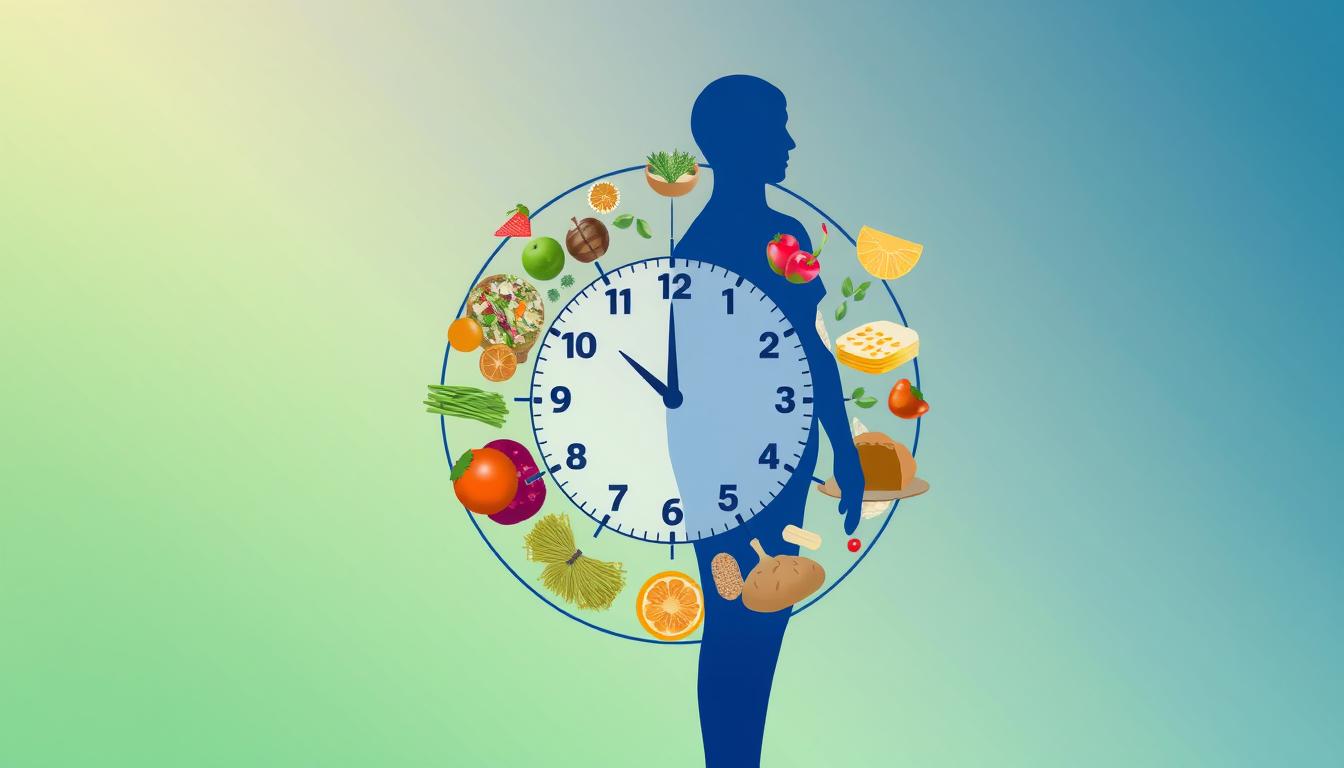Welcome to my guide on the fascinating connection between circadian rhythm and meal timing. I found out how our body’s internal clock affects our wellness. By learning about our body clock, we can make habits that improve our health.
Aligning meal times with our natural rhythms boosts health and quality of life. Let’s explore how syncing meal times can change our eating habits and well-being.
Understanding Circadian Rhythm
Circadian rhythms are our body’s natural cycles that happen every 24 hours. They affect many parts of our body, like sleep, hormones, and how we eat. Knowing how these rhythms work can help us live healthier and more productive lives.
What is Circadian Rhythm?
Circadian cycles act like a biological clock, controlling our sleep and metabolism. They help our body sync with the day and night. This affects our mood, how well we think, and even our health.
The Science Behind Our Body Clocks
The study of circadian rhythms explores how our body reacts to different things. Hormones like melatonin and cortisol are key players. Melatonin helps us sleep at night, while cortisol wakes us up in the morning. Learning about these hormones can make us more aware of how we can improve our health.
How Circadian Rhythm Affects Eating Patterns
Our body’s response to light is key in setting our meal times. Light and dark cycles control hunger hormones, helping us eat when we should. Natural light tells our brain to start digestion and metabolism.
The Role of Light and Darkness
Light helps our internal clock work right. In the morning, it makes us feel awake and ready for breakfast. As night falls, it makes us sleepy and less hungry.
This balance affects when we eat and how well we digest food. It’s not just about when we eat, but how well our body uses food.
Influence on Digestion and Metabolism
When we eat affects how our body uses food. Eating in sync with our body’s natural rhythm is best. This means eating earlier in the day for better digestion.
At night, our body’s metabolism slows down. This makes eating late less effective. Eating with the natural light cycle boosts our metabolic health.

Circadian Rhythm and Meal Timing
Understanding how our circadian rhythms affect meal timing can change our daily lives. Research shows that eating at certain times can boost health. Knowing these times helps manage energy and well-being.
Optimal Meal Times Based on Circadian Rhythms
Choosing the right times to eat is key for better nutrient absorption and energy. Studies point to a meal schedule that matches our natural rhythms:
| Meal | Recommended Time | Notes |
|---|---|---|
| Breakfast | 7:00 AM – 9:00 AM | Breaking the overnight fast boosts metabolism. |
| Lunch | 12:00 PM – 2:00 PM | Provides sustained energy for the afternoon. |
| Dinner | 6:00 PM – 8:00 PM | Eating earlier supports digestion and sleep. |
Benefits of Aligning Meal Times with Body Clock
Eating in sync with our body’s rhythms brings many health perks. Research shows this can lead to:
- Enhanced digestion, promoting better nutrient absorption.
- Improved metabolic health, assisting in weight management.
- Better sleep quality, as eating earlier aids in relaxation.
- Balanced energy levels throughout the day, reducing fatigue.
Best Practices for Meal Timing
Learning how to schedule my meals has boosted my energy and health. I use simple strategies to manage my meals during work and social events. This way, I stay productive and feel good all day.
How to Schedule Your Meals
Having a set meal schedule keeps my energy up. I plan meals around my work and daily tasks. Here are some tips that help me:
- Set regular meal times to control hunger.
- Take short breaks for healthy snacks between meals.
- Eat meals when I’m active to stay energized.
- Prepare meals in advance for busy days to avoid unhealthy choices.
Foods to Eat During Specific Times
When I eat certain foods at specific times, I feel better. Here’s a table showing the best foods for different times:
| Time of Day | Meal Type | Suggestions |
|---|---|---|
| Breakfast | Meal | Oatmeal with fruits, eggs with spinach |
| Mid-Morning | Snack | Greek yogurt with honey, a handful of nuts |
| Lunch | Meal | Grilled chicken salad, quinoa bowl with veggies |
| Afternoon | Snack | Sliced apple with almond butter, carrots with hummus |
| Dinner | Meal | Baked salmon with asparagus, stir-fried tofu and rice |

By following these meal timing tips, I’ve adopted healthier eating habits. It helps me stay ready for the day. Choosing the right foods at the right time boosts my health and energy.
Challenges of Syncing Meal Timing with Circadian Rhythms
Keeping meal times in sync with my body’s natural rhythm is tough. Work, social events, and unexpected tasks often disrupt my routine. This makes it hard to eat at the same times every day. Such irregular eating can harm my health and well-being.
Common Obstacles I Face
There are a few big challenges I face:
- Irregular work hours that clash with optimal meal times.
- Social gatherings that involve late-night snacking or drinking.
- Environment-related distractions during scheduled meal times.
Tips for Overcoming These Challenges
Despite these hurdles, I’ve found ways to beat them:
- Meal prepping: Preparing meals ahead of time means I always have healthy food ready, even when I’m busy.
- Setting reminders: Alarms or apps help me keep to a regular eating schedule that fits my body’s natural rhythm.
- Communicating with friends: Telling my friends about my meal goals helps them understand and support me at social events.
Health Benefits of Improved Meal Timing
Starting a regular meal timing routine has changed my health for the better. It has helped with weight management and sleep. Learning how to match meals with my body’s natural rhythms has been key.
Weight Management and Meal Timing
Studies show that eating at the right times can help with weight control. Paying attention to when I eat has made a big difference. I now know how much to eat and what to choose.
My body seems to work better with a set eating schedule. This has helped me reach my weight goals.
- Eating meals at regular intervals can help regulate hunger hormones.
- Consistent meal timing has helped me avoid late-night snacking.
- Research shows a correlation between mealtime consistency and successful weight loss.
Impact on Sleep Quality
Meal timing also affects sleep quality. Eating at the same times has improved my sleep. Sleep clinics say late meals can mess with sleep times.
Eating earlier means better digestion and relaxation before bed. This has made my sleep better.
- Regular meal timing can promote a balanced circadian rhythm, leading to better sleep cycles.
- Avoiding heavy meals close to bedtime has become a key practice for restful sleep.
- A structured dining schedule enhances my overall nightly rest and recovery.

Personal Experience: My Journey with Meal Timing
Reflecting on my journey with rhythm-based eating, I see big changes in my life. Since starting a structured meal timing, I’ve noticed many positive changes.
Changes I’ve Noticed Since Implementing Rhythm-Based Eating
I wake up with more energy now. I feel ready to start the day. My mood is better too; I don’t get those afternoon slumps anymore.
This eating rhythm has also made me choose healthier foods. I eat when my body tells me to, following its natural rhythms.
Lessons Learned Along the Way
Consistency is crucial, I’ve learned. Regular eating schedules bring more benefits over time. It’s important to listen to my body and adjust my eating based on how I feel.
Being open-minded and flexible is key. My needs can change, and I need to adapt. I hope my story inspires others to try rhythm-based eating. Let’s support each other on this journey.
Additional Resources and Tools
I’ve found some great resources to learn more about circadian rhythms and meal timing. The app MyCircadianClock is really helpful. It lets me track my meals and sleep easily. This way, I can see how my habits match my body’s natural rhythms.
Health apps like these can really change my daily life for the better. They help me stay in sync with my body’s natural cycles.
Books like The Circadian Code by Dr. Sachin Panda are also very useful. They explain the science behind our body clocks and give tips for better meal timing. These books have helped me eat in a way that’s more in tune with my body.
The website Healthline has lots of articles on circadian rhythms. They offer tips on how to schedule meals for the best health. Using these tools has really changed how I think about food and health. It’s made my life better overall.

